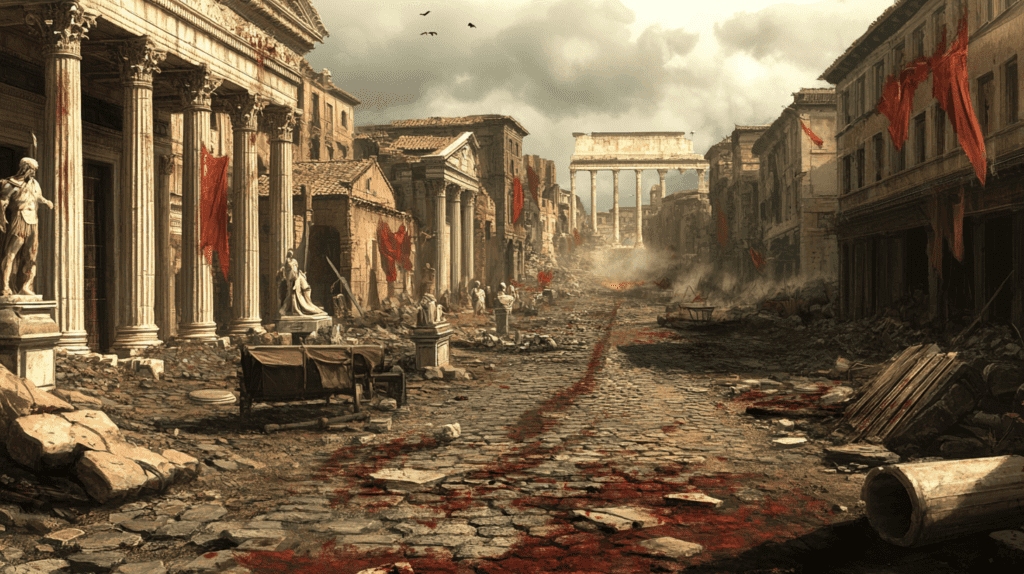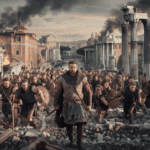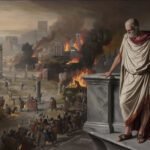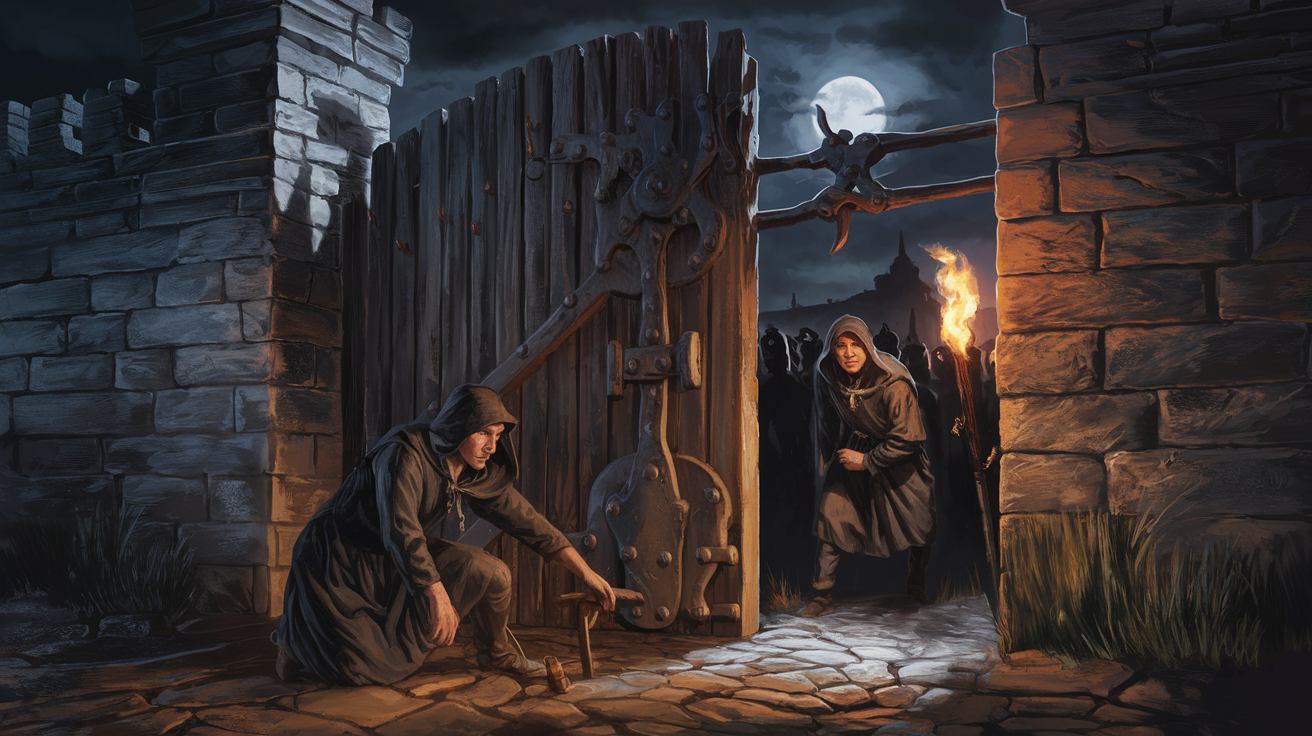
The Second Fall of Rome: 410 AD
The Visigoths, a Germanic tribe, had been pushed into Roman territories by the advancing Huns. Initially, they sought asylum within the Roman Empire, but were met with hostility and duplicity. This led to a series of conflicts, culminating in the Battle of Adrianople in 378 AD, where the Visigoths decisively defeated the Roman army. Despite a subsequent treaty that granted them land and semi-autonomous status, tensions remained high.
Alaric, who had served as a commander in the Roman army, became the leader of the Visigoths around 395 AD2. Alaric had helped defeat the Franks and other allies of a would-be Roman usurper. Despite losing many thousands of his men, he received little recognition from Rome and left the Roman army disappointed His ambitions were fuelled by a desire for a stable homeland for his people and a sense of betrayal by the Romans. After several unsuccessful attempts to secure a permanent settlement for his people within the Roman empire through negotiation and force, Alaric turned his sights on Rome itself.

By 410 AD the Roman Empire had been slowly declining over the past three centuries. By the time Alaric entered Italy the Empire was in trouble with many rulers and kings claiming regions that used to be controlled by Rome. Even the status of the city of Rome had changed as it was no longer the administrative capital of the empire. The capital had been moved to the city of Mediolanum (modern day Milan), but in response to Alaric’s invasion of Italy, it was moved again, this time to the city of Ravenna. The new capital was more defensible and offered the possibility of escape by sea if the city was overrun.
Alaric had been negotiating with the Roman emperor Honorius, who was safe in Ravenna, for many days when he was betrayed by the emperor. Alaric was attacked in the place where he had arranged to meet and talk with Honorius, he survived but abandoned negotiations and marched in anger on Rome.
In the city, food was scarce. The Visigoths had besieged Rome a number of times in recent years, only to break off the attack when their demands to the Emperor were met. This time, Alaric laid siege again and slipped agents into the city under cover of night. At dawn, these agents caused a western gate – the Porta Saleria – to be opened, and the army of the Visigoths flooded into the streets.
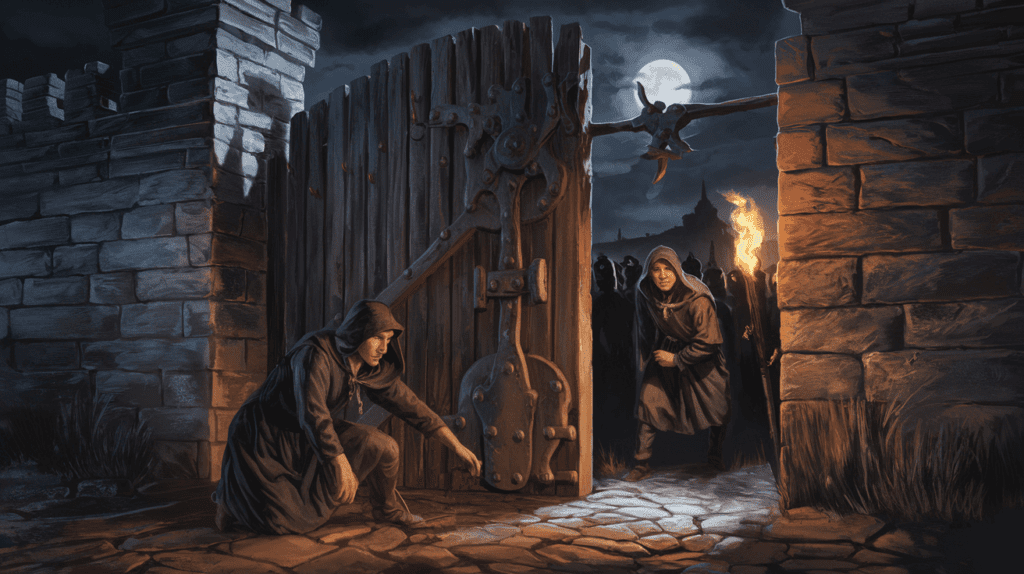
The sack of Rome by Alaric’s army, though dreadful, was by no means as vicious as it could have been as on this occasion, the attacking army was more intent on plunder than on wholesale destruction. Similarly, it would not be uncommon for the population to be slaughtered on a large scale, but again this does not seem to have happened. In fact, it seems that Alaric actively caused many people to be spared the violent death which they no doubt expected. Alaric was, in name at least, a Christian king. Christian churches were off limits to the pillaging soldiers, and those who fled there for sanctuary were spared violence from the looters.
All this, of course, does not mean that the sack of Rome was not a violent and vicious affair. The Visigoths committed acts of rape, killing and torture during the sack, and they captured and enslaved many Romans. Everywhere they went they carried off all the valuables they could find, and after a three-day reign of terror, the city was emptied of wealth. All who could flee the city did so and many fled to the Roman provinces in North Africa. The city was ravaged for three days before Alaric gathered his troops and marched south. The army, loaded with countless treasures and dragging thousands of prisoners, continued with their destruction, sacking every Roman city they came to.
Only a few months later, however, the mighty Alaric was struck down by an illness and died, and the army elected a new leader and marched back north. The damage, however, was done, and the sack of Rome and southern Italy marked the beginning of the last chapter in the history of the Roman Empire in the West. The economy of the region was devastated, and the rule of the Emperor irretrievably compromised. The population was declining fast, famine and disease were rife, and political order was steadily deteriorating.
